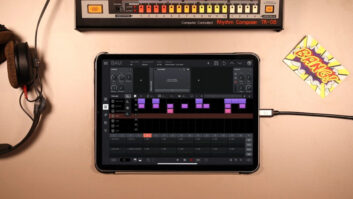Santa Cruz, Calif. — Molino Networks, a start-up consumer electronics company based here, introduced two aggressively priced DVD video servers capable of cataloging and storing hundreds of DVD discs, CDs, home videos and JPEG images in full quality on very large hard drives.
‘These are the first products to deliver against the promise of Media Center PCs in a device that’s not a PC,’ said Amy Love, Molino Networks marketing VP. ‘It is as easy to use as a DVD player, does not compromise the quality of the video or audio fidelity and it maintains a very simple, easy-to-use interface.’
The entry product, called the Media Mogul, will incorporate 300GBs of storage capacity and will retail for $995 — thousands of dollars less than similar competing entertainment servers. The storage capacity is said to be sufficient for 50 DVDs or 500 CDs, all stored bit-for-bit without any compression that can affect playback quality. Entire contents of the discs – including menus, copy protection and extra bonus material – are stored to the drives.
The flagship product, called the Media Mogul TB, will sell for $2,995 and includes 1 terabyte, the equivalent of four 250GB hard drives, of storage, good for up to 200 DVDs or 2,000 CDs or ‘weeks of home videos.’
Company founder and CEO Tim Sylvester said he conceived the concept last summer because ‘I felt there had to be a better way to store and catalog digital content, and at the same time preserve the quality of that content.’
The company was started initially last September with the backing of friends and business associates who saw the power of the concept, he said.
Sylvester is currently finalizing negotiations with ‘a Taiwanese manufacturer’ to build the products for the company.
Molino Networks is able ‘to be more aggressive with pricing and margins’ than some competitors, because it is ‘a start-up company without the historical cost structures of a consumer electronics company,’ said Sylvester. ‘Plus, we don’t layer on extra software that we have to license. We are lean and mean.’
The key enabler of the system, Sylvester said, is an ‘importing’ system he developed to make bit-for-bit transfers of content onto the hard drives.
‘There is a big difference between importing and ripping,’ Sylvester said. ‘Ripping is a copy and compression process. With importing we make a perfect digital copy of the entire contents of the DVD or CD.’
Sylvester said the importing process is much faster than a typical ripping process.
‘Where ripping a DVD can take up to 8 hours, the Molino system requires less than 15 minutes to import an entire DVD and less than 2 minutes for a CD,’ said Sylvester.
Content can be automatically cataloged using a networked Internet connection running GraceNotes’ CD database for music CDs or GraceNotes’ new Video ID database for DVDs.
Video ID is billed as the equivalent of CDDB for DVDs. Molino Networks is the first to announce support for the new application, Love said. The Video ID program will include the title, actors, genre, cover art, year of release, and a plot synopsis.
The units, which are not much larger than standard DVD players, feature a front-loaded optical disc drive that can be used to play or import discs. The drive includes CD-R functionality to allow users to back up/archive content — most specifically photos — on removable discs. Also on the front is a 6-in-1 Flash Memory card reader, USB port for digital camera connections and a FireWire port for digital camcorder connections.
Back-mounted video outputs include composite, component, S-Video and DVI jacks. Audio jacks include stereo RCA jacks, both coax and optical digital outputs, and a networkable Ethernet connection.
The devices can be connected to a home network using the Ethernet jack and CAT-5 cable, or wirelessly using an Ethernet adapter.
When tied into a network, the unit can make use of a Web browser on a connected PC to perform advanced content management, enabling such tasks as playing back image slide shows synched to music. Additionally, users can import MP3 files or JPEG still images over the network and copy them into the Media Mogul.
To launch, Molino is using a direct sales e-commerce model, taking pre-orders from consumers over its Web site. The company is asking for a $100 deposit (fully refundable if a customer decides to cancel) in advance. Products will ship this summer. At that time, Molino will also open up sales through select e-tail partners.
The company is in the process of putting together its retail distribution plan, and will be looking first to distribute through select custom installers and other high-end resellers by the 2004 holiday period. Additional resellers and brick-and-mortar retail accounts will be added by the 2005 holiday season.
Love said the business plan calls for the company to have sufficient availability to larger retail chains in 2005.
As for Hollywood’s concerns, Love said Molino was ‘very focused on the digital rights management’ when developing the Media Mogul concept. The company consulted both movie studios and advisors from Stanford University Law School to ensure that it adequately protected the rights of both the artists and the copyright holders, ‘while simultaneously allowing consumers the ability to use the content they’ve purchased in the way they see fit.’
The Media Mogul system uses both the CSS security/encryption and includes as ‘a short-term solution’ a new ‘auditing function,’ that asks the consumer to validate that they still own a DVD through a two-minute, one-time-only process about two-weeks after a DVD is imported. The system makes it impractical to import a rented or borrowed DVD, Love said.
Sylvester said the Media Mogul supports most widely available content standards, including DVD videos, music CDs, Video CDs, JPEG files, MP3s and DivX video, but doesn’t currently support Windows Media Audio or less common audio compression schemes. Those formats will be supported through future software updates, Sylvester said. HDTV video support will be considered after content is widely available and file formats are standardized, he said.
Media Mogul will not contain personal video recorder (PVR) functionality, although the system is designed to eventually work with PVRs, Love said. She added, that Molino wanted to avoid ‘redundancy’ and felt that PVRs were rapidly evolving to a point where they soon will be commonly available in cable and satellite set-top boxes and other devices. Instead, Media Mogul will eventually be enabled to archive content recorded by PVRs.












